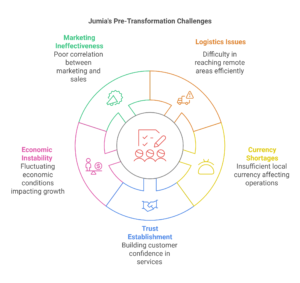Digital transformation is rapidly reshaping the retail landscape in Africa, and Nigeria is at the forefront of this revolution. With increasing internet penetration and evolving consumer behavior, Nigerian retailers are adopting digital strategies to enhance efficiency, drive sales, and expand their reach. This case study examines the digital transformation journey of Jumia, Nigeria’s leading e-commerce platform, providing insights for businesses.
Overview of Jumia – History and Background
Founded in 2012, Jumia is a pioneering e-commerce platform in Africa, driven by a mission to leverage technology to enhance everyday life across the continent. Known as the “Amazon of Africa,” Jumia was Africa’s first tech company to list on the New York Stock Exchange under the ticker JMIA and now operates in 11 countries, reaching over 631 million
Through its online marketplace, logistics, and payment services, Jumia connects consumers with products, services, and local businesses, creating job opportunities and empowering small to medium-sized enterprises (SMEs). Over the years, Jumia has expanded its digital payments and logistics infrastructure to reach underserved areas, helping to overcome limited e-commerce infrastructure. In 2022, Francis Dufay, who previously led Jumia in Ivory Coast, became CEO and has since driven strategic shifts to navigate economic challenges, expand into rural areas, and strengthen Jumia’s core competencies.
Challenges Before Digital Transformation
Before its digital transformation, Jumia faced significant obstacles in scaling its business across Africa’s diverse markets. Challenges included logistics issues in reaching remote areas, currency shortages in markets like Nigeria, and difficulty in establishing trust among customers. Compounded by economic instability and high inflation, these issues impacted Jumia’s profitability and growth. The company also struggled to sustain marketing effectiveness, often seeing no direct correlation between marketing spend and sales growth, which led to high cash burn without strong returns. These pre-transformation challenges highlighted the need for a more sustainable, tech-driven approach to serve African consumers effectively.

The Digital Transformation Journey of Jumia: Key Technological Solutions
Jumia’s digital transformation started by tackling the barriers that hindered growth. One of the key steps was launching Jumia Pay, a digital payment system that offered an alternative to cash transactions, especially crucial during Nigeria’s cash shortage. This service allowed customers to pay upon delivery through bank transfer, accommodating cash-strapped buyers and ensuring business continuity. In addition to payment solutions, Jumia expanded its reach into rural areas by developing a distribution network to bring products to more remote locations, often overlooked by competitors. Streamlining logistics-as-a-service to only countries with mature infrastructure allowed Jumia to focus on its strongest markets, such as Nigeria and Ivory Coast. These early steps in the digital transformation journey strengthened Jumia’s operational foundation, making it more adaptable and resilient.
The digital transformation also incorporated key technological solutions, notably in advertising. Since the inception of Jumia Advertising Services, the team has assisted nearly 400 partners, including well-known brands like Coca-Cola, Samsung, Hewlett Packard, MTN, Dettol, Nokia, Pringles, Kellogg’s, and Indomie, in effectively targeting their intended audiences. Jumia Advertising Services employs an omnichannel approach that encompasses both online and offline avenues, including web banners, push notifications, email newsletters, and branding on warehouses and driver uniforms. This comprehensive strategy allows for running campaigns informed by customer behavior, combining automation with Customer Relationship Management (CRM) software and other technologies for precise targeting.
A comprehensive example of Jumia’s advertising success is the 2020 partnership with Reckitt Benckiser, during which the team managed to grow sales on the platform by 400% in one year, multiplying Reckitt’s initial customer base by a factor of seven within the first quarter. To achieve this growth, Jumia devised a strategy addressing each step of the marketing funnel and organized brand-focused online events to drive special attention to Reckitt’s products. One such brand day event in Egypt enabled Reckitt to achieve 20 times their average daily sales on the platform in just one day.
Jumia Advertising also offers pre-organized visibility packages to simplify the advertising process for partners. These packages include special events like Super Brand days and competitions that amplify engagement and accelerate new consumer acquisition, strategically scheduled and promoted for maximum participation.
At Jumia, the commitment remains focused on helping sellers grow their businesses while enhancing the customer experience. By ensuring partners acquire new customers and increase sales, Jumia Advertising presents relevant offers in a non-intrusive manner, further solidifying its role in the company’s digital transformation journey.
Implementation Process
Jumia’s implementation of digital transformation has been multifaceted, focusing on enhancing its technological capabilities and addressing the unique challenges of the African e-commerce market. The journey began with the establishment of the Jumia Tech Centers, which aimed to attract and cultivate local tech talent. Building on the success of the Porto Tech Center, Jumia inaugurated new centers in Cairo and Alexandria in late 2021 and early 2022, respectively. These centers were not merely about recruiting tech talent but were designed to embody Jumia’s core values and reflect the diverse populations they serve.
The Cairo Tech Center has grown into a robust team of over 160 professionals across various disciplines, including Backend and Frontend Development, Mobile Engineering, UI/UX Design, and Data Engineering. This diverse team has been instrumental in developing tailored solutions for Jumia’s operations. Utilizing modern techniques such as Behavior-Driven Development and UI/UX Design, the team has improved user experiences on platforms like Jumia Food and JumiaPay. They focused on optimizing performance in low-connectivity environments and enhancing functionalities that cater to local needs.
Key initiatives included creating web applications to facilitate the JForce program, allowing customers to shop on behalf of others, and streamlining connections between online platforms and the Help Center for improved customer support. Monthly virtual town-hall meetings fostered collaboration across continents, aligning team members with Jumia’s tech philosophy and reinforcing a culture of continuous improvement.
In addition, Jumia’s partnerships with educational institutions like the German University of Cairo (GUC) have helped nurture tech talent early in their careers, through lectures on the latest trends and mock interviews. This proactive approach ensures a steady influx of skilled professionals into the tech ecosystem, ultimately supporting the growth of Jumia’s digital capabilities.
Impact of Digital Transformation on Jumia’s Operations
The digital transformation undertaken by Jumia, particularly through its Tech Centers, has significantly enhanced its operational efficiency and customer experience. By leveraging local talent to develop customized technological solutions, Jumia has addressed key bottlenecks in the African e-commerce landscape, such as internet penetration disparities and connectivity issues in rural areas. The ability to optimize apps for low-spec devices and ensure performance in challenging connectivity conditions has broadened Jumia’s reach and improved service delivery.
Moreover, the digital transformation has facilitated the development of sophisticated platforms that streamline internal processes and enhance vendor interactions. The improved user experience on the Jumia Food platform, with better navigation and enhanced visibility into delivery processes, reflects the successful integration of customer feedback into service design. JumiaPay’s fortified back-end architecture has resulted in a more reliable and secure payment system, enabling the rapid expansion of product and service offerings while ensuring the safety of transactions.
The impact of these initiatives extends beyond operational efficiencies; they have fostered a culture of innovation within Jumia. The focus on collaboration and shared learning across teams has resulted in quicker adaptation to market changes and improved responsiveness to customer needs. As Jumia continues to expand its Tech Center approach to other African cities, the lessons learned and successes achieved in Cairo and Alexandria will serve as a model for cultivating a thriving tech ecosystem across the continent.
Lessons Learned
Here are the key lessons learned and best practices that can be derived from this in depth analysis of this case study.
1. Local Talent Development is Crucial: Establishing Tech Centers focused on cultivating local tech talent ensures that the solutions developed are relevant to the specific challenges and needs of the local market. This approach enhances innovation and ownership among the workforce.
Future Outlook for Jumia
Under the leadership of CEO Francis Dufay, Jumia is taking significant strides toward growth after achieving considerable progress in cost management and operational efficiency. For the first time, the company is engaging in a secondary share sale aimed at accelerating its business expansion. According to Dufay, the newly raised funds will primarily be used to strengthen Jumia’s supply chain network, especially by enhancing logistics capabilities to improve accessibility in smaller cities and expand its overall reach.
Jumia’s digital transformation offers a compelling example of how Nigerian retailers can leverage technology to overcome operational challenges, improve customer experiences, and expand their market reach. For FMCG and B2B businesses, the lessons from Jumia’s journey shows the importance of investing in e-commerce platforms, mobile payment systems, and data-driven marketing strategies. By following this roadmap, Nigerian retailers can position themselves for success in the digital era.




